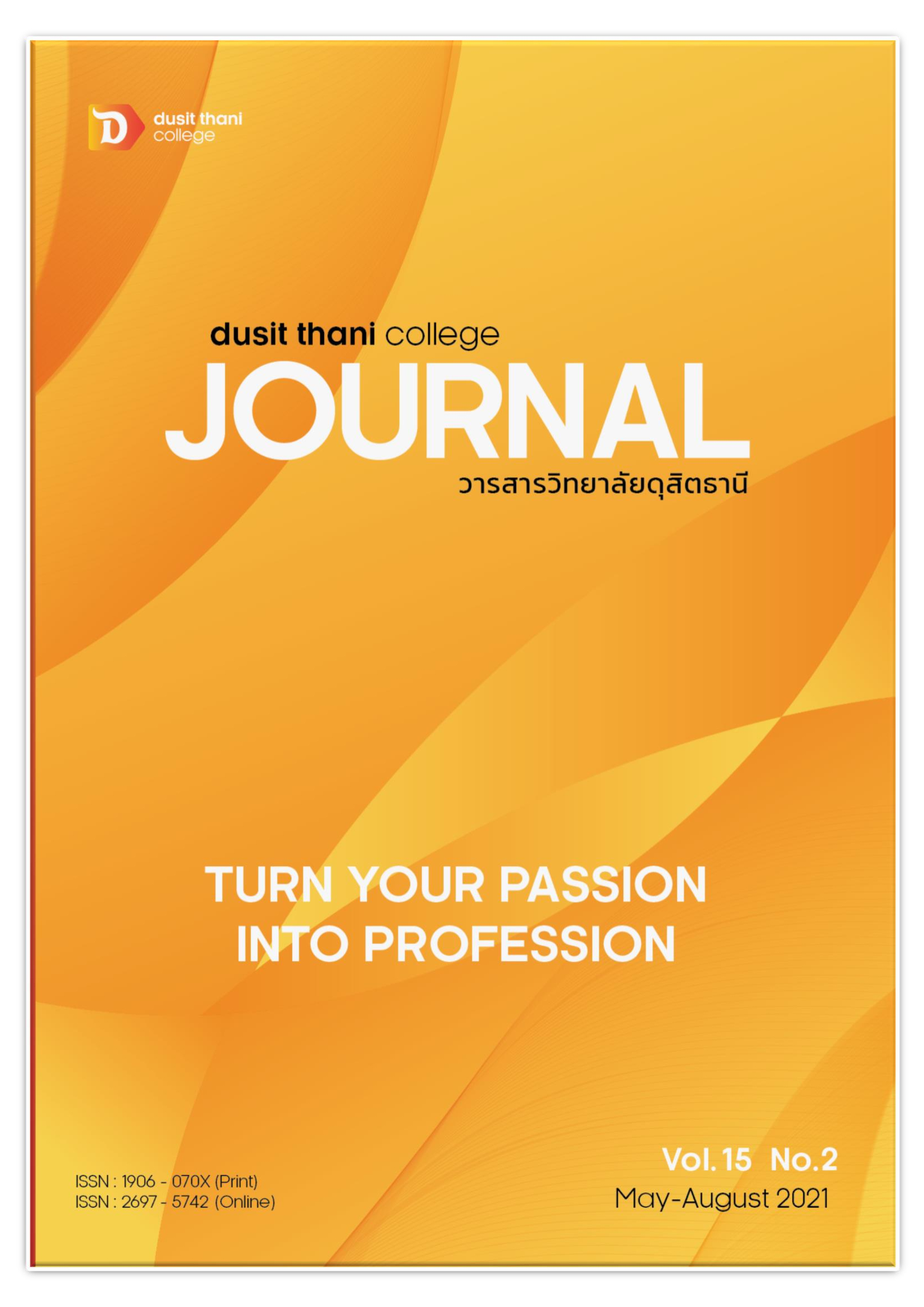STRATEGIC FACTORS INFLUENCING FUTURE DECISION -MAKING BEHAVIOR OF TOURISTS WITH PRIOR EXPERIENCE OF HOTEL SERVICES AND RESTAURANTS IN THE EASTERN ECONOMIC CORRIDOR (EEC)
Main Article Content
Abstract
The objectives of this research were 1) to study future decision-making behavior of tourists with prior experience to use the service of hotels and restaurants, 2) to study strategic factors influencing future decision-making behavior of tourists with prior experience to use the service of hotels and restaurants, and 3) to study the influence of strategic factors on future decision-making behavior of tourists with prior experience to use the service of hotels and restaurants. The sample was 400 Thai tourists. A questionnaire was used as a research instrument for data collection. The analytic results of the overall consistency index of the adjusted model indicated that the model was consistent with empirical data and all eight consistency indices met the acceptable criteria with the following parameters: χ2=95.47, df=86, relative χ2=1.11, p=0.227, CFI=1.00, GFI=0.98, AGFI=0.95, RMSEA=0.017, SRMR=0.027. Furthermore, the results revealed that customer relationship management (CRS) and corporate (hotel) image had the statistically significant influence on future decision-making behavior. Service quality of restaurant and social media influencers had the statistically insignificant influence on future decision-making behavior.
For qualitative research, data were collected from in-depth interview with 15 hotel and restaurant business operators in Chachoengsao, Chonburi and Rayong. The sample was selected based on a purposive sampling. The findings would be beneficial as the guidelines to develop business strategies, and prepare manpower and budget for service staff training, promote customer relationship management and social media marketing for hotel and restaurant entrepreneurs.
Article Details
Article Screening Policy
- All research and academic articles to be published must be considered and screened by three peer reviews in the relevant field / article.
- All articles, texts, illustrations and tables published in the journal are the personal opinions of the authors. Editors don't always have to agree. And no responsibility whatsoever is the sole responsibility of the author.
- The articles to be published must never be published. Where did you first publish? And not in the consideration of other journals If the audit found that there has been a duplicate publication It is the sole responsibility of the author.
- Any article that the reader sees as being plagiarized or impersonated without reference. Or mislead the work of the author Please let the journal editor know it will be your greatest blessing.
References
Association of Thai Travel Agents. (2019). Insights into Thai tourist behavior, “Thai people” are not like any other country in the world. (Online). Retrieved 10 January 2020, from http://www.atta.or.th/tourist. (in Thai)
Badarneh, M. B., & Som, A. P. M. (2011). Factors influencing tourists’ revisit behavioral intentions and loyalty.
Chryssoula Chatzigeorgiou. (2017). Modelling the impact of social media influencers on behavioural intentions of millennials: The case of tourism in rural areas in Greece. Journal of Tourism, Heritage & Services Marketing, 3(2), 25-29.
Hair, J.F. Jr., Anderson, R.E., Tatham, R.L., & Black, W.C. (1998). Multivariate Data Analysis, (5th Edition). Upper Saddle River, NJ: Prentice Hall.
Kirkpatrick, N. (2018). Sport business and marketing collaboration in higher education. Journal of Hospitality, Leisure, Sport & Tourism Education, (22), 7-13.
Lim, X.J., Radzol, M., Cheah, J.H., Wong, M.W. (2017). The impact of social media influencers on purchase intention and the mediation effect of customer attitude. Asian Journal of Business Research, 7(2), 19-36.
Luvai F. Motiwalla & Jeff Tomson. (2012). Enterprise System for Management. Pearson Education, Inc. Publishing as Prentice Hall.
Maduka Udunuwara. (2015). Customer relationship management (CRM) of hotels in the context of variety-seeking behaviour (VSB). Edith Cowan University Research Online.
Pratminingsih, S. A., Rudatin, C. L., & Rimenta, T. (2014). Roles of motivation and destination image in predicting tourist revisit intention: A case of Bandung–Indonesia. International Journal of Innovation, Management and Technology, 5(1).
Rezaee, Z. (2017). Corporate sustainability: Theoretical and integrated strategic imperative and pragmatic approach. J. Bus. Inq. 2017, 16, 60–87.
Schumacker, R. E., and Lomax, R. G. (1996). A Beginner’s Guide to Structural Equation Modeling. Lawrence Erlbaum Associates, Inc., Mahwah, NJ.
Sofie Biaudet. (2017). Influencer Marketing as a Marketing Tool – The Process of Creating an Influencer Marketing Campaign on Instagram. International Business, Degree Thesis International Business.
Suphawan Thanomkiatphum. (2019). Hotel business worse! Prepare to call for intense control “Home Sharing” (Online). Retrieved 11 January 2020, from https://www. bangkokbiznews.com/news/detail/856798. (in Thai)
Suksawang Poolpong. (2014). Principles of structural equation model analysis. Princess of Naradhiwas University Journal, 6(2) May–August, 136-143. (in Thai)
Woods, S. (2016). The emergence of influencer marketing. University of Tennessee Honors Thesis Projects.
World Health Organization Thailand. (2020). Coronavirus disease (COVID-19) questions and answers (Online). Retrieved 19 September 2020, from https://www.who.int/thailand
/emergencies/novel-coronirus-2019/q-a-on-covid-19 (2020, September 19)


